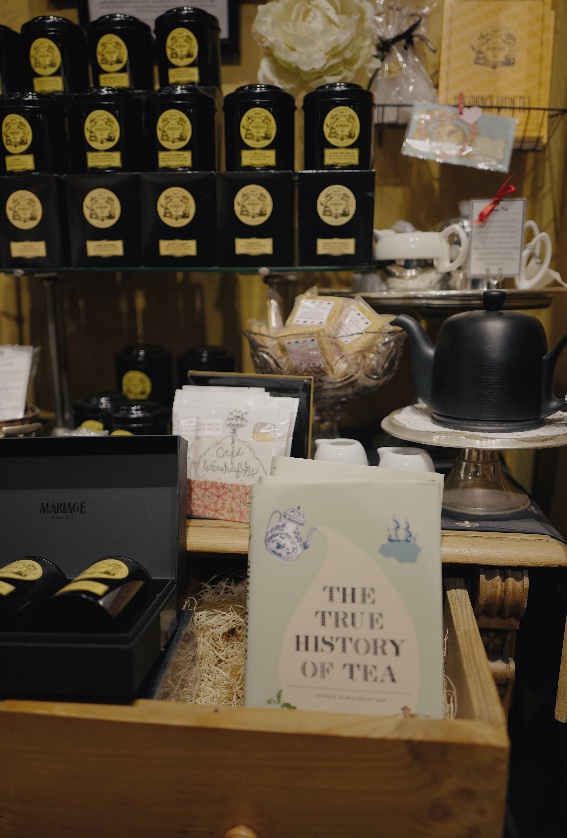P.O.S.H. tea in Chicago
« previous post | next post »
From Miffy Zhang Linfei:
I went to Chicago over the weekend, and look what I found in a small European vintage shop named P.O.S.H.
Miffy continues:
(I was thrilled when I saw it, and the owner was also excited to learn that I am the student of the author of the only book they sell at the store.)
Though in close competition with coffee and alcohol (wine, beer, whiskey…), in my estimation tea is overall the house beverage at Language Log.
Despite the excellent book selection at the tea shop, it's unfortunate that the purveyors propagate a popular but spurious etymology of the word posh on their website. From the P.O.S.H. about page:
Q: WHAT DOES P.O.S.H. STAND FOR?
A: A little known bit of trivia, the word posh actually began as an acronym. It all started at the turn of the last century when there was considerable steamship traffic between England and India. The wealthy passengers would book their cabins on the Port side of the ship going Out of England and on the Starboard side of the ship for the return journey Home.
This kept them safely out of the blistering sun while making the 30–plus day journey into the sweaty climes of the Indian sub–continent. Tickets were stamped P.O.S.H. (for Port Out Starboard Home) and people began using the acronym as a word to describe luxury travel and elegant accommodations.
This is an example of what Larry Horn calls etymythology, and it's been widely debunked. See, for instance, Merriam Webster's "Does 'Posh' Really Come From Ocean Travel?"
It's not that we don't like this etymology—it's that we have no evidence for it. We have seen no tickets stamped with POSH; we've found no magazine articles talking about this fashionable mode of travel. Here's what we have found: posh entered the English language early in the 1900s, in a wholly un-nautical context, to mean "smart" and "stylish." Try though we might, we can't find any definitive information on its origins.
Merriam-Webster has more details on a special FAQ page devoted to posh.
Selected readings
- "Two brews" (2/6/10)
- "English incorporated in a Sinograph" (11/18/19)
- "Sinographs for 'tea'" (1/10/19)
- "Multilingual tea packaging" (4/7/18)
- "Caucasian words for tea" (1/26/17)
- "Trump tea " (1/13/17)
- "Don't Kettle " (11/4/10)
- "Don't eat the water " (3/17/15)
- "Two brews " (2/6/10)
- "cactus wawa: the strange tale of a strange character" (11/1/14)
- "Cactus Wawa revisited" (4/24/16)
- "Things you can do with 'water' in Cantonese " (4/2/19)
- "Bubble tea blooper " (9/28/17)
- "Lap Sangsouchong " (12/3/14)
- "Kung-fu (Gongfu) Tea " (7/20/11)
- "Rōmaji dialog between 'bread' and 'tea'" (8/9/15)
And there are many, many other relevant posts.
[Thanks to Ben Zimmer]


Laura Morland said,
March 4, 2022 @ 12:39 am
Thanks for thé link to the delightful Merriam-Webster article.
I notice that the tea they purvey appears to be that of Mariage Frères — très parisien, therefore très "posh" !
Kate Bunting said,
March 4, 2022 @ 5:44 am
The '1892 novel' referred to on the FAQ page (in which Mr Murray Posh features) is George and Weedon Grossmith's 'The Diary of a Nobody'.
Andrew Usher said,
March 4, 2022 @ 7:56 am
Zombie etymology, I guess one would say – you just can't kill it.
Benjamin E. Orsatti said,
March 4, 2022 @ 8:27 am
Laura Morland said,
March 4, 2022 @ 12:39 am
Thanks for thé link
—
ISWYDT
Victor Mair said,
March 7, 2022 @ 1:33 pm
Here are related items from Hobson-Jobson:
https://dsal.uchicago.edu/cgi-bin/app/hobsonjobson_query.py?qs=posh
https://dsal.uchicago.edu/cgi-bin/app/hobsonjobson_query.py?qs=TOPEEWALA&searchhws=yes